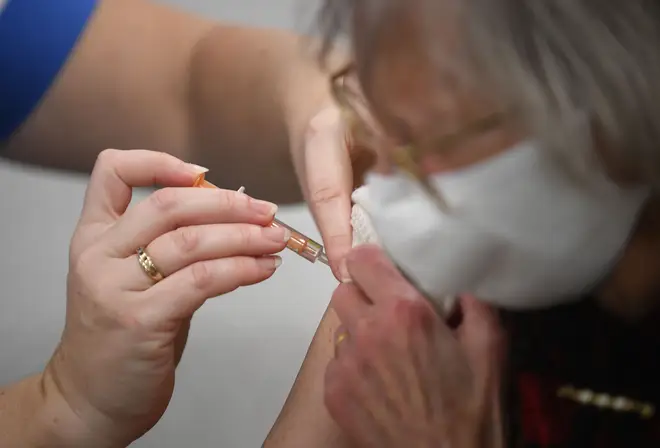
Paul Brand 10am - 12pm
11 January 2021, 21:43

What is the latest on the UK's Covid vaccine program? What vaccines have been approved in the UK and what's the difference between them?
With the race to vaccinate Brits against coronavirus as soon as possible LBC looks at the current state of the UK's vaccination program.
Earlier today mass vaccination centres around the country threw open their doors as hundreds of patients received their Covid-19 jab,
Health Secretary Matt Hancock told a Downing Street press briefing that vaccination was the "fastest route to safely lifting restrictions" and the Government was on track to vaccinate the 15 million people most at risk by the middle of February.
Read more: 'Your actions can make a difference' - Health Secretary urges public not to be complacent
Almost 2.3 million people in the UK have been given the first dose of a coronavirus vaccine, according to new figures, while 388,677 second doses have also been given.
Some 78,005 first doses have been given in Northern Ireland, on top of the 1,959,151 in England, 86,039 in Wales and 163,377 in Scotland - to give a UK total of 2,286,572.

Boris Johnson warns of stricter Covid restrictions in England
Health Secretary Matt Hancock has set out the Government's new plan for delivering vaccines, which it is hailing as the "keystone of our exit out of the pandemic".
A rollout strategy was also detailed in Wales. In Scotland, the Oxford/AstraZeneca jab is available in more than 1,000 locations from Monday. Northern Ireland already has the Pfizer/BioNTech and the Oxford/AstraZeneca vaccines being distributed.
Read more: 2.6 million Covid-19 vaccination jabs given in UK as PM warns of 'perilous moment'

Queues form outside Epsom vaccination centre
While hundreds of vaccines are under development worldwide, three have been approved for the UK. First came the Pfizer/NioNTech jab, then the Oxford/AstraZeneca, and last week, the third, made by US firm Moderna.
In total, the UK has ordered around 370 million doses of vaccines.
Read more: NHS facing 'most dangerous situation in memory', Professor Chris Whitty warns
Watch: London patients queue for Covid vaccine in near-freezing temperatures
The Pfizer/BioNTech and the Moderna treatments are called RNA vaccines (for ribonucleic acid). They inject part of the genetic code of the Covid-19 coronavirus directly into people's cells - encased in tiny fat droplets to protect it - in order to spark the body's immune system into learning what the virus is, and responding. Simply put, it starts making part of the virus inside the body, the immune system then learns to identify the virus, then spring into action to defeat it, to stop Covid-19 developing.
The trouble is, RNA vaccines need to be kept at extremely low temperatures - Pfizer's at minus 70C, and Moderna's at minus 20C - often requiring very careful delivery chains involving hi-tech freezers and dry ice.
The UK-developed Oxford/AstraZeneca jab is a viral vector vaccine. With these, scientists can add the RNA genetic code of the Covid-19 coronavirus to the genetic material of another virus - making a viral vector - which is then used in the vaccine. Once in people's cells, this, like RNA vaccines, triggers the immune system to recognise the Covid-19 virus and do its work to defeat it.
Piggy-backing on another virus might cause people to worry about contracting some other form of infection. Scientists have avoided this risk by using harmless, genetically altered, viral vectors which cannot cause diseases.
While both RNA and viral vector are double-dose vaccines, the big plus with the latter is it can be stored at a regular fridge temperature, making delivery far easier, especially in poorer countries.

Vaccinations underway at Millennium Point Vaccination Centre
Trials have shown the Moderna vaccine to be 94.5% effective, and the Pfizer/BioNTech jab to be 95% effective.
The Oxford/AstraZeneca vaccine has been shown to be around 70% effective, but again, its major advantage is ease of distribution.
The Government set out its priority groups on December 30. Top of the list are nine different categories, based mostly on age, referred to as Phase 1 of the programme. The list starts with residents in care homes for older adults plus their carers.
Second comes people over 80 plus frontline health and social care workers.
Third comes all people over 75, then people over 70 plus anyone classed as extremely vulnerable due to other clinical conditions, down to the ninth grouping of people aged from 50-54.
This top nine was determined from data showing the number of people in each category who would need to be vaccinated to prevent one death.
Phase 2 deals with people whose jobs put them at risk to Covid exposure. The Government says this could include first responders, the military, people employed in the justice system, teachers, transport workers and public servants who are critical to the fight against the pandemic.
Seven mass vaccination centres will open across England.
Ashton Gate football stadium in Bristol, Epsom racecourse in Surrey, the Excel Centre where London's Nightingale hospital is based, Newcastle's
Centre for Life, the Manchester Tennis and Football Centre, Robertson House in Stevenage and Birmingham's Millennium Point will offer jabs to people aged 80 and older, along with health and care staff.
These centres will be joined later this week by hundreds more GP-led and hospital services along with the first pharmacy-led pilot sites, taking the total of sites to around 1,200.
The Government has set a target of having 15 million people vaccinated by mid-February, with every adult in the UK vaccinated by autumn.